Aerith In Light Of Healthcare Provider
Aerith in light of healthcare provider
So, I’ve wanted to write an analysis about Aerith in light of her medical viewpoint for quite a long time but only recently got the chance to complete it. It is well known in the game that Aerith is the healer of the story. She possessed great MP with a limit break to heal and buff people which greatly affect your gameplay. Of course, you can equip others with Healing and Prayer materias to render them useful for healing as well. But story-wise, no one can take away Aerith’s status as the healer. We know in canon that Aerith provided herbs to the Sector 5 slums doctor to create medicine. And if you finished the Corneo Stash side quest in Chapter 14, you can return to the church and see a couple of elderly sitting on the pew praying. And when you come closer to them you’ll hear them talking about how they didn’t see Aerith around and they’re sure she’s alright and probably be around healing people. You know, since the Sector 7 plate just fell. (Even though Aerith is not alright actually coz she was kidnapped by Shinra by this time) Point is, we are fed by the NPCs on how much Aerith had helped around as a healer. She had been doing this for years.
While being in denial about who she actually is, being a healer had always been implanted in her. She is used to it. When you’re used to being a healer, there’s a certain level when you have different reaction compared to others. The way you think is different. Apart from that, she’s also a Cetra. And we knew for a fact Cetra had a certain affinity towards souls who are returning to the Planet. Meaning, as much as she is used to healing others, she’s also used to sensing death.
My whole point is that, being a Cardiac Anaesthesiologist and Intensivist as I am, I can totally relate my position with Aerith, as we both had constantly helped people and encounter death on daily basis. While I’m pretty confident that majority of these might be coincidence (because I’m pretty sure there were no doctors in the SE team), I thought the coincidence is pretty cool to ponder upon and I’m amazed at how the subtle differences between Aerith’s reaction to events from other characters.
I’m gonna ignore the meta part of Aerith, mainly because I’m not discussing about how much Aerith knew, and if there was anything in jeopardy of what she knew whatsoever. So we’re gonna focus on the fact that she is used to healing and feeling people’s death. People who are used to death on daily basis had a certain unique view on life and death. And that affects how we act upon facing them too. While this is evident throughout Remake, I’m gonna focus on the plate drop event to be more concise. I will also use Tifa as comparison to make it easier to see the difference between the reaction of the two. Let’s start!
1) Aerith is quick in emergency situation.
When you are used to people dying, you developed a certain immunity and you are able to have sound mind and composure at sudden change of event. As healthcare providers, we face stable situations turning into critical real fast. And we have a switch in our minds that turn us from standby mode to rescue mode. This is exactly what happened to Aerith when Don Corneo revealed Shinra’s plan to blow up Sector 7’s support pillar. Tifa is part of Sector 7. It is her home. Which was why her reaction showed how she was super devastated, she slowly stood up and muttered “They wouldn’t…” because she couldn’t believe it. Aerith? She had that switch in her mind, and she immediately turned and say “Come on, guys! We gotta go!”. She switched into that critical mode in a second. It helps that she’s also not personally connected to Sector 7, and thus her judgement was not as impaired. Of course, they both switched into critical mode in the sewer, but it was at the moment of reveal that made it different. Just like how healthcare providers switched at the moment of reveal that their patients are at the brink of death—you immediately jumped into rescue mode.
2) She plans for the worst.
Remember after they defeated Abzu and Tifa started to question Corneo’s information? She didn’t want to believe it, because it didn’t make sense to destroy your years of efforts building the plate just to get back to a small group like AVALANCHE. Think about the money they put in to build it, they’re gonna have to put them all again. In fact, along their way out of the sewer, Tifa voiced out multiple times how this had been bothering her. But I’m intrigued with Aerith’s reply “If he’s telling the truth, then we should go. And if it turns out he was lying, then so what?”. This here is exactly what doctors do. We plan and prepare for the worst. And if the worst didn’t happen, then so what? If you have ever had a life saving surgery, your doctors would tell you “You need this surgery coz you might die. But if you do the surgery, there’s a high chance you’ll survive, but there’s a small chance you’ll die too”. And we prepare for that small chance that our patients die. No, we don’t let our preparations lacking because we hope they’ll survive. We prepare to the worst outcome possible and get all the equipments ready in case they’ll die. If they didn’t, then so what? It doesn’t mean our preparations were futile efforts. It only means we were prepared. And that line of Aerith seriously hits home to me.
3) She hopes for the best.
Before they crossed the water sewer, Tifa once again voiced out how she couldn’t stop thinking about what Corneo said, and she was still hoping that he was lying. And then Aerith said “The future isn’t set in stone”. (Again, I’m gonna ignore the meta part of Aerith) And then she proceeded to set up that small date with Tifa. Believe it or not, this is actually what we do during bad calls. We’d talk about what we would do after all this ends; we’d go out dining, or playing games/darts, or go drinking, or whatever it is that makes us happy. Just to keep our minds calm and to allow us to hope for the future, even if it’s just a few hours away. It gives us hope and courage to go on. We plan for the worst, but we hope for the best. The more critical the situation is, the more you need to be level headed. And needless to say, after this point onwards, Tifa is much more calmed down from her struggle to keep herself focus.
4) She follows orders.
This might sound weird to some, but the ability to cast away your worry and focus on what you can do, instead of what you should do, is important in emergency situations. You need to know what you don’t know. You don’t get in the way of your comrades. If you’re not good in intubating, you don’t insist to intubate in emergency situations just because you wanna help. Seriously, you’ll just make things worse. When Cloud, Tifa and Aerith were attacked before climbing up and out of the sewer, Cloud asked both Tifa and Aerith to keep going. Aerith immediately answers “Okay” and left—without a single but. This is significant, because it shows that Aerith knew she’d be better off leave. She doesn’t need to offer help, coz her help was not needed. This is not the place where she could help. The ability to recognise this is very important for healthcare professionals. Tifa was a bit more reluctant to leave, but that’s probably because she is a martial artist in game. Also, the fact that Aerith could still joke “We’re not delicious” is just so real lol! Yup, we joke sometimes when we’re facing deaths—doesn’t mean we lose focus in saving the dying person in front of us, don’t worry. And then it happens again when they reached Sector 7 when Cloud asked them to stay with Wedge as he goes up, and Aerith immediately answered “sure"—because she can “patch” Wedge up, it’s where her abilities lie. This is even more accentuated when an injured Wedge argued that he can still fight, when he clearly can't—making this point even more obvious. Aerith is someone with the healthcare mind, Wedge was not.
5) She supports her comrades emotionally even when she’s worried too.
When they reached the surface, they spotted Shinra helicopter. Cloud assured them they’re only on patrol. Aerith turned to Tifa and said “Don’t worry, we’ll make it in time”. This moment is also very iconic to me. As I mentioned, I’m an anaesthesiologist. We are the support doctors to surgeons and physicians. Those moments when we’re operating on a AAA surgeries and the patient is losing litres of blood and literally dying, we’re pumping bloods in with our hands and get those Level 1 machines operating, and the surgeons would be panicking because it keeps bleeding? Yep, I did say it before. “We’ll make it. Just concentrate with the surgery and don’t worry about the bleeding”, even though I’m sweating and dying here trying to keep the patient alive. But I pretended to be calm in front of my team and cheered them on. Because the whole team need to keep calm. If one of the team lose hope, then bid your chance farewell. As an anaesthesiologist, we’re almost like the anchor in the room. People look at us to know if everything’s alright. I need to tell them it’s alright, so they need not worry. Aerith knew Tifa is worried. And she tried to keep Tifa calm with reassurance.
6) She doesn’t discriminate.
After they defeated the ghost at the haunted maintainance facility, Cloud tried to kill it, and Aerith didn’t let him. When Cloud said that thing was dangerous, Aerith said she knows and added “but even so…” she didn’t feel right about killing it. (Let’s ignore the fact that the Ghoul was a lonely creature for now) It then goes to drop the train wreck which almost killed them had it not been for Cloud. Now this would have been avoided had Aerith let Cloud killed it—maybe. But here’s the thing. When you’re hyper aware that people are dying left and right, you value life more. No one deserve to die, even the worst criminal in the world. You’re a law-abiding citizen? You’re a criminal? It doesn’t make a difference to us. I know this is something super hard to comprehend. But technically only when the law subject the criminal to death sentence that a person should be left to die. I’ve been a doctor for eleven years, I was a prison doctor for two. I had first hand experience of dealing with criminals. It’s not my job to determine whether they deserved to die or not. It’s not my call whether they will turn a new leaf or not had they lived. I know this is something others find difficult to relate and agree—happens to my non-medical family and friends. The verdict to us is simple. It’s a life. It’s worth saving. Period. (Technically the ghosts are dead though but my point still stands)
7) She tries in her best abilities and lets go of what is out of her control.
Tifa’s emotions are tampered again when they confirmed Shinra was going to drop the plate when they overheard the Turks conversation. Her voice shook, we can literally hear it. Aerith’s response was “all we can do now is keep moving”. And she’s right. When they reached Sector 7 and the Whispers were preventing them, she said “we have to get past whatever it takes”. And later on Tifa left to help Cloud and Barret, and Aerith agreed to get to Seventh Heaven to ensure Marlene’s safety. Wedge had a short mental breakdown when he realised he was no good to anyone up or down the crime scene. And Aerith told him “We can still save a lot of lives”, “That’s no excuse to give up”, “I need to know I did everything I could”. Her encouragement helped Wedge save more people. Some argued, did she not care about the lives that already died? Now here’s my point; no, we don’t. Sorry if this sounds harsh, but really. What can we do for people who are already dead? Nothing. What can we do to people who are still alive? Everything. And this is the core of being a healthcare provider—we prioritise. Yes, we’re also humans. We can get emotional when our own friends and relatives die. (Aerith might not be as calm had it happened at Sector 5) But when we put the healthcare provider cap on, we meant business. That is why when disasters happened, and we triage people with black tag? That’s when we know we couldn’t do anything for them. We don’t mourn at the black tags. We move on to the other tags instead. So that we know we already did everything in our power to help. And yes, it doesn’t matter even if we lost more lives than we saved. It’s worth it, even if we only saved one person out of thousands deaths. Just like how Aerith saved Betty in Sector 7, that one life is worth it.
More Posts from Terra-fatalis and Others
An Attempt to Clinically Analyze Sephiroth's Psychosis at Nibelheim

Sephiroth has fascinated me as a villain for a long time, but I’ve also struggled to “figure him out” for just as long. For all the simplicity of his villainous goals (i.e. become a god, destroy the world), it’s really the heart of his breakdown in Nibelheim that confounded me regarding his motives and the causal factors behind how he becomes what he becomes. I think Sephiroth's story can be interpreted in drastically different ways depending on how you see the explanations for his breakdown preceding the Nibelheim Incident. Not to mention, there’s the multiple retellings of the incident within the Compilation and the inconsistencies that come with it.
I’m still in the process of unraveling how to approach Sephiroth’s psychology, so this won’t be a regular analysis. Rather, this is mostly going to be a stream-of-consciousness type of piece, where I just let my thoughts flow. Definitely expect some stuff to sound rough or disjointed, and possibly some inaccurate facts due to my terrible memory (please let me know). Also, for the sake of the most updated canon, we will go with the Crisis Core version of events.
~Major FFVII and Crisis Core spoilers ahead~
Psychosis

Firstly, I want to address the clinical term that can describe what happened to Sephiroth at Nibelheim. I’ve heard people call it a mental breakdown or psychotic break, among other things. If we want to be consistent with the psychiatric language of the DSM-5, we would say that Sephiroth experienced the onset of a psychotic episode.
Psychotic episodes are a state of significant psychological disturbance that involves a loss of touch with shared reality. Historically, what we now know as psychotic episodes were once called madness or insanity. The duration of an episode affects what type of psychotic disorder would apply, but overall, psychosis can be either transient or continuous.
It’s hard to say which is the case for Sephiroth, specifically because of how his prognosis transforms pre- and post-Lifestream dip. Pre-Lifestream, it’s clear that he went into an abrupt and severe state of psychosis. Even though there were already warning signs prior to when he holed himself up in the Shinra mansion basement, Sephiroth’s behavior change still occurred in a short amount of time and marked a drastic change from the anguish and confusion he initially experienced upon first learning what Jenova is. He is experiencing a psychotic episode that marks a clear departure from his prior functioning.
Afterwards though, Sephiroth learns what Jenova truly is and makes a conscious decision to use its power and influence over the Lifestream for his own means. At this point, we can’t say that it’s a temporary condition. Not to mention, the question of how much Jenova is influencing Sephiroth also complicates how we understand Sephiroth’s psychology. At best, I would say that post-Lifestream Sephiroth is experiencing an ongoing psychotic disturbance.
Delusions

At the heart of Sephiroth’s turning point to villainy is a delusion, a fixed and false belief that is resistant to change even in the presence of contradictory evidence. Although I've seen it used a lot in casual contexts, delusions are in fact a clinical term for distorted beliefs. Essentially, delusions exist beyond reason and cannot be logically refuted. Delusions are a hallmark feature of psychosis, involving a resistance to the facts of reality that conflict with one’s beliefs.
There are several reasons that someone might develop a delusion. Obviously these reasons aren't always mutually exclusive, but I think what reason you attribute to Sephiroth's breakdown influences how you understand it.
Certain people are genetically predisposed to delusional thinking. Jenova. Injected in the womb. Supernatural prenatal development. Need I say more?
People come up with distorted ways of explaining the unexplainable. This is the type of thinking that is linked to an inclination for conspiracy theories. Sephiroth was searching for answers about his birth and origins, and with false, piecemeal information, he formed the erroneous conclusion that he was a Cetra. I wouldn't say this is the driving force behind his decision to burn down Nibelheim, but you can see the gateway to vengeance through this avenue.
People have trouble coping with life and preserving their self-esteem, therefore they use delusions to attempt to uphold it. This is the most sympathetic perspective, mainly because it boils Sephiroth down to the misunderstood savant that is mourning the loss of his self-worth. More on this later, since this is the angle I see portrayed most in Crisis Core.
People experience significant life stressors, such as low socioeconomic status, trauma, and drastic life changes that heavily influence how they perceive and understand the world. We could create a whole list of known or presumed "life stressors" in Sephiroth's life, but if we want to highlight a specific one, it would be the discovery of the Jenova Project files. It could be argued that it was deeply traumatizing to him, enough to rock his worldview.
Reasons aside, there are also several different types of delusions classified in the DSM-5. I think Sephiroth shows features of at least two types. You could say Sephiroth experienced a grandiose delusion, or what you might know as a delusion of grandeur. This is defined by the belief that one is extremely powerful or important. Sometimes it even takes on a religious bend, leading to the belief that one is omnipotent or holy. Sephiroth believed he was the last of the Cetra race, one that was more connected to and respectful of the planet compared to humanity. He was "the chosen one to rule this planet," someone exceptional and superior to everyone else.
You could also say that Sephiroth was experiencing a persecutory delusion. This is when someone believes he is "being conspired against, cheated, spied on, followed, poisoned, maliciously maligned, harassed, or obstructed in the pursuit of long-term goals." Sephiroth drew the conclusion that he had a duty to punish humanity for persecuting the ancient Cetra. He believed he had to pursue vengeance for Jenova and for Cetrakind. People with persecutory delusions tend to demonstrate significant anger and violent behavior, which also checks out with Sephiroth's subsequent decision to burn down Nibelheim.
Obviously, both the grandiose and persecutory delusions transform a bit when Sephiroth learns about Jenova's true nature as an extraterrestrial, not a Cetra. But that's a conversation for another time; remember, we're talking about the psychotic episode that became the gateway to Sephiroth's villainy. So, let's backtrack a bit and talk about how Crisis Core chose to lean into a sympathetic portrayal of Sephiroth's psychology.
Self-Concept

We still know very little about Sephiroth’s childhood and upbringing (although it looks like Ever Crisis may change that?), aside from several key facts. We know that he was born an experiment, having been injected with Jenova cells in the womb. We know he was essentially raised by Shinra and did not get to experience a normal childhood. He was known to be a prodigious fighter and was the reason that the SOLDIER program was created. As a teenager, he fought in the Wutai War and gained his status as a war hero.
This is all to say that though Sephiroth knew little of his childhood, he knew one thing for certain. He was a very good fighter, and a hero to Shinra. Sephiroth’s established self-concept revolves around this fact. He was likely praised and lauded for his wartime achievements, and even before then, we can presume that Shinra scientists noted him to be an exceptional fighter. He was the epitome of prestige and strength.
Let’s contrast that with the information he gains right before the Nibelheim Incident. When Sephiroth sees the monsters at the reactor and begins to question his connection to them, he began to mull over his identity and existence. Sephiroth knew he was unusual and exceptional even as a child, and he said so himself that he doesn't know what it was like to have parents or a hometown to speak of. Genesis then reinforces what Sephiroth feared, that he is a monster and a product of experimentation. He was told he was subhuman, repulsive, an abomination.
Sephiroth’s self-concept started as that of a prodigy, someone who is an extremely capable fighter. After the war in Wutai, he was labeled a war hero. Once he was led to believe that he was a monster, this shatters his worldview. He went from seeing himself as a prominent hero to seeing himself as subhuman. This is further driven by the fact that Sephiroth had already lacked answers about his origins and craved a sense of home, of parental warmth and connection. Because of this gap in his history, the premise that he was no more than a monster was eerily plausible. With his self-concept dramatically rocked, he was left starving for answers to what he is. This is what led him down the rabbit hole, seeking an explanation that would either tell him that he was not a monster, or that his initial self-concept can still be upheld somehow.
And thus, Sephiroth was in a vulnerable place where a grandiose or persecutory delusion can uphold his self-esteem and self-concept. If Jenova is truly the last of an ancient race, then Sephiroth is exceptional, not an abomination. If the Cetra had powers that humans didn't have, then Sephiroth was powerful, not just a monster. The delusion takes hold because it is something Sephiroth needed in order to preserve his worldview, his belief that he is special and important.
This is how Crisis Core gets you to sympathize with Sephiroth. He's painted as a lonely savant that lacked a home and a family, and so when he was told he was a monster, his self-concept was shattered and radically warped. In order for him to protect it, he needed to come up with a delusion that would uphold his understanding of the world. Sound familiar? I don't think it's a coincidence that Sephiroth's psychology here sounds parallel to Cloud's, especially since I've considered delusional disorder for them both.
It'll be a while before I gather enough thoughts to move onto how Sephiroth progressed from this state to his post-Lifestream-dip, Meteor-summoning, god-seeking self. But for now, I think this helps paint a picture of how I've been trying to conceptualize him.
Oh those glasses ❤️❤️❤️




FINAL FANTASY VII REBIRTH (2024) ↳ Aerith x Sweet Gangster (⌐■ˬ■)❀°。
During the dates with Aerith, Tifa or Yuffie at Gold Saucer, Cloud is involved in a theatre play.
It's a very simple and innocent tale where the player has multiple choices. Leaving aside the jokes, the story is about an Evil Dragon King who arrives in a peaceful kingdom, kidnaps the princess and takes her on the peak of a dangerous mountain. The hero goes to rescue her and can ask for the help of a knight or a wizard: if he asks the knight to intervene he's knocked down immediately, while the wizard says that love is the key to defeat the dragon. At the end of the play the dragon is defeated by the power of love.
It's only a fairy tale but...

Nibelheim was a peaceful town before the arrival of Sephiroth. In the area there are several dragons and Sephiroth burns down the whole town. Tifa, the daughter of the village chief, follows him in the reactor on Mt Nibel. Zack tries to fight Sephiroth and he's knocked down, but when Cloud arrives and sees Tifa unconscious, he finds the strenght to stab Sephiroth.
...
What a coincidence.
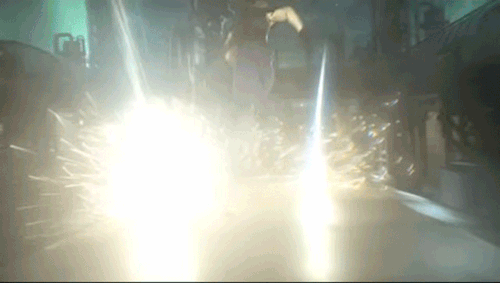
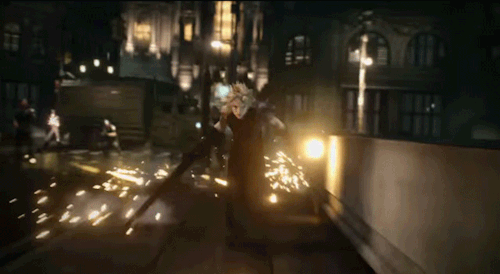
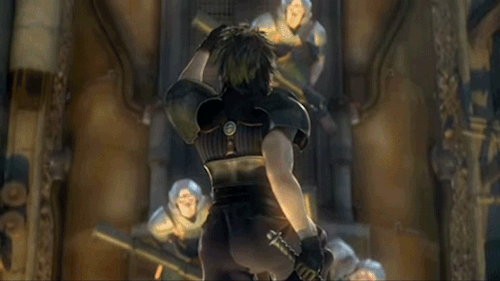
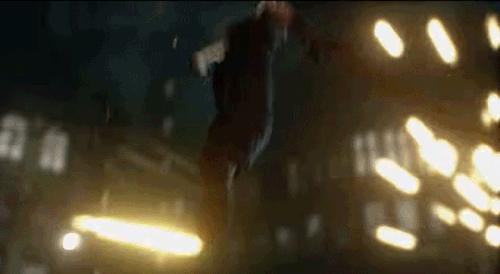
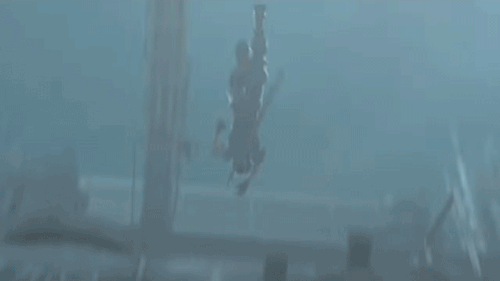
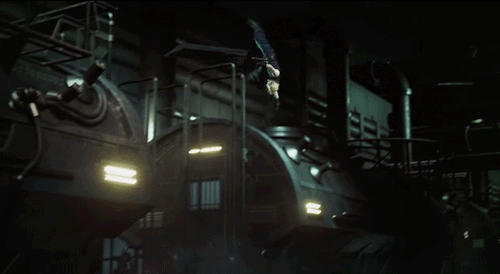
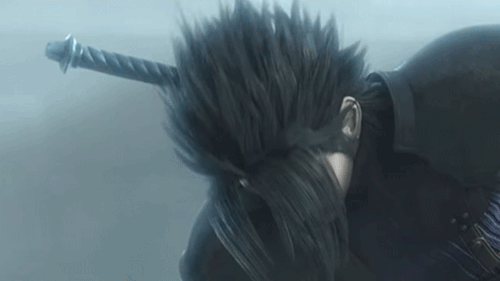
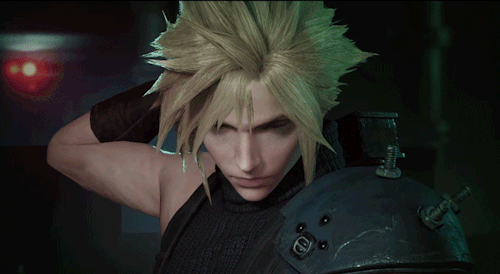
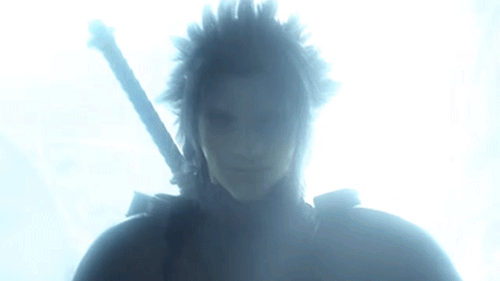
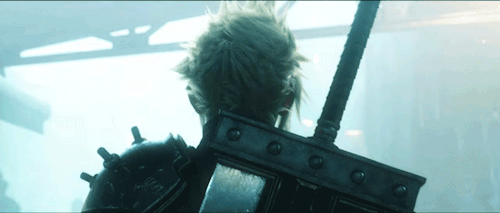
Zack and Cloud parallels
Crisis Core vs. Final Fantasy VII Remake
A question about Kingdom Hearts, but can be for other stuff too. Do you think some important context or subtext is lost in the translation process from Japanese to a second language, even if it's translated to the best of a translator's ability, and if so, do you prefer a more literal translation over an official dub?
Hello! Thanks for the ask.
To answer the first question, there's different points to be made given the case by case nature of the topic. Important or simply interesting (these are not the same thing) information absolutely can be lost in the process of translation, but there's a lot of things fans need to understand:
Per discussion, is it actually lost, whether in the specific line or that of the overall context elsewhere?
Is the meaning actually *important* or imperative for understanding context [subtext]?
If lost, is it something that could've been localized creatively within the limitations of its presentation (voice acting/lip-sync, text space, etc.)?
Was it something that couldn't even be translated literally within the corresponding localized language? And/or did it not naturally flow into the writing of the actual scene itself for the given language?
Keep in mind that some interesting nuances built within a language system is really tailored for THAT language, and doesn't have to (or can't be) be transferred to another language smoothly in the production process of localization—if it's actually important, they might have to find a way, and chances are a literal translation may not even be enough to accomplish this. So to the second question—it isn't really “literal” vs localization for me, because whether one or both of these things can get the job done is circumstantial. Ultimately, what I care about most is whether what is written makes sense and can still be seen to retain what matters contextually (and sometimes, this means you can even get MORE or something more direct from a localization as opposed to “literal”). I’m using “ “ because really, you don’t want literal, for the majority of the text, it just doesn’t work that way as smoothly as people think. But I understand sometimes literal is actually “close to definition as possible” for people. (sometimes, indeed)
Anyway, if there is an issue with what's written, I know a "literal" translation doesn't always solve the inherent factors dependent upon the specific nature of the JPN language. The "literal" definition doesn't always fully capture how the Kanji is contextually used in the writing for another language. If I ever felt something was completely missed within a localization, my instinct is to first check the nature of the JPN and how it's written contextually to see how it fairs.
Of course, if it's information that isn't really based on the nature of the Kanji and how it's used, that it's something just being misunderstood in translation, then that isn't even a matter of whether it was literal or not—it was just wrong, and could've been right in any form if the text was understood (meaning, I'd take it literal or localized as long as the information is correct). In comparison to the amount of important storytelling text actually localized in video game projects, this doesn't nearly happen that often, though.
To look at Kingdom Hearts:
There have been many, many examples, especially between #1 and #2 discussed within fandom over the last 20 years. lol The majority is very miniscule and inconsequential (if even non-existent of a difference with proper understanding)—in KH3 I tend to think of some scenes between Sora and Kairi that has been discussed. @phoenix-downer has some excellent JPN/ENG comparisons of Sora and Kairi's Paopu Fruit and Light in the Darkness scenes (plus more) that serve some examples—Phoenix might be more readily able to remember some things over the years than I. There’s also this line from Xemnas about finding the Ancient Keybladers in KH3—this one can reasonably create a misunderstanding, but at the same time we don’t exactly have all the information at this point in time anyway.
One thing I do tend to think of is the scene between Aqua/Terra/Ven and the Disney Passes—where the term hogosha 保護者 (guardian, protector, patron, parent) is used in JPN, while in ENG it was written as "grown ups". There's a subtext here that has been missed by some ENG speakers. Similar to #4 (about literal translations), this is one of those cases where contextually speaking, the ENG went with what made sense for the scene and all factors corresponding to it, while still retaining something similar to the concept context-wise. As you can see based on the definition, the term hogosha is very flexible in use due to its span of multiple different words, but in its usage, it always has the connotation of something "parental". But, translating it as straight up "parent(s)" doesn't always work because of the nuances of the word. e.g. From FFXIII, Lightning is a hogosha to Serah, but this isn't to say that Lightning is literally her parent/mom—the contextual nature of hogosha tells more than this but with the same connotation. Sometimes it can be directly "parents/legal guardians", like how it's used to refer to what is essentially PTA school meetings (hogoshakai 保護者会). There's a reason why hogosha is distinct from just more direct words for parent (like oya 親 or ryoushin 両親).
This flexible nuance isn't readily and neatly packaged in a single word in ENG, however, and while, say, “guardian” [parental] can fit in some situations on its own, the connotation of parental isn’t so readily available like it is for hogosha alone. (A good example is this post I made) So, contextually there are other ways to capture it, and that may have to be with a non-literal translation. But, its meaning was missed by some ENG speaking fans, so when they hear "Aqua and Terra are like parents to Ven", they have no idea where that's coming from. Of course, some people were able to understand how this is carried contextually by the word "grown ups" and the situation of the Disney Passes—otherwise, some people completely missed that parental nuance, which would be significant of representing the relationship between Aqua/Terra to Ven.
Sometimes it isn't a localization issue, but a perception one.
With that being said, if in the case of other fandoms/series? It's all over the place. I've seen it all, between something being lost (important or just interesting [unimportant]), something being a mistranslation, or something being retained and people are honestly just trippin' because of misunderstanding things. Straight up. #4 (literal translation/context issues) happens a lot, in that case.
For example, recently I made this post and a follow up post about functionalities of JPN pronouns for (I, me) and the differences that lay there—there's also an extra layer I think I didn't include, which is that between using a specific pronoun in the form of hiragana/kanji/katakana, sometimes it's a stylistic choice as well. (Don't worry about this if you're confused lol). Point is, in this situation I also talked about how this was something that only applies for the JPN language and not necessarily others (especially ENG).
But again, a lot of this is case by case and we'd have to consider the #1-4 above, and for me, I know that to get the job done, it doesn't even have to be literal in order for this to happen.
As an extra note, fans REALLY need to understand localization, if even for SE specifically, to really talk about it efficiently. A lot don’t, and don’t care to. There is a sea of information to gather to form a perspective, and if they had this information, it’d change what they think about the “changes” a localization will make. One of the most blunt translators I can think of (Tom Slattery) gave this thought towards this very topic, and it’s just the tip of the iceberg. So I’ll leave it with this:
Vocal fans on the internet often complain about translators "changing" things in the English versions of games. This always amuses me, as we're very often working alongside the team to help name those things in the first place. For example, on Final Fantasy XIII, we were asked to help with the naming of the roles--Medic, Synergist, Ravager, and so on. We were intending to use different names in Japan and the US/EU from the start, and we (the English translators) brainstormed and proposed both sets. For the Japanese version, they needed English words that (A) sounded cool when rendered into Japanese, and (B) would be understood by non-English-speaking Japanese players, so we worked with the writers to come up with a set of consistent-sounding terms that met those criteria. For the localized version, our focus was on creating names that would have a more sci-fi feel to a native speaker's ear, and also abbreviate to three letters in a way that looked natural and made the short forms quickly and easily distinguishable from one another. We didn't "change" anything; we just generated two different sets of names for two different audiences.
Retroactive integration of the English translation into the Japanese version happens on projects quite often as well. For example, we were asked to come up with a translation for the names of the transporters in the Nautilus theme park. The Japanese name at the time was not something that really worked for us, so we went with "Nautilift." A few weeks later, that started popping up in the Japanese script. That kind of thing is always a huge compliment. It's a collaborative process. No one is going out stomping all over each other's work just for the heck of it.
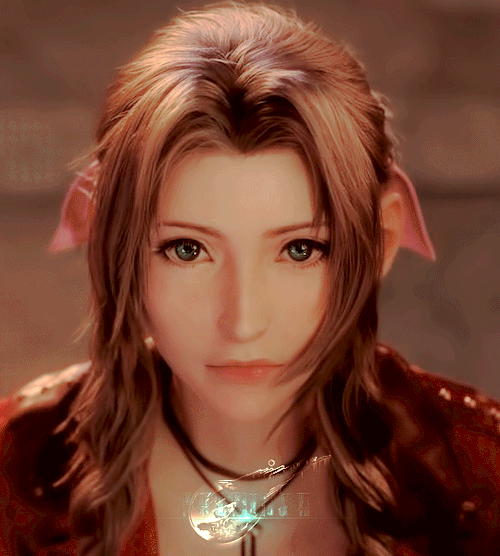
A E R I T H G A I N S B O R O U G H
What makes the identification of a character should start at their character construction—as a writer, this is when you’re determining the existence of this character, the motivation that drives their agency and purpose in the story (or even that of the story itself), etc. If this is layered [depth], only then would I personally say they’re a “complex character”.
What flows through that and becomes a part of the character’s “dynamic range”, like their personality and the range of elements attached to their character that is shown in different situations—like the, “this character acted this way here”, and “they showed this there”, “they have this significant item to represent this”, etc. This can easily be synonymous to that construction, or it can really just be it’s own thing if written that way. This in of itself can be interesting and “layered” in the sense that there is variety, hence the “dynamic range” terminology, but the understanding of that is different than what is for the sake of describing a character’s depth for identification. I would argue this is defined at the construction stage as opposed to in the counted showings of dynamic range, that otherwise, doesn’t have to be dependent upon what’s established in the construction. If you can see the flow in the range, chances are it started at the construction either way. A character’s growth is also NOT what defines their complexity, but that too can be synonymous to the construction and flow through for better storytelling. If their purpose is what changes and adds layers, depths—the WHY to what their purpose is, the it definitely applies. In most cases, you’d hope it does, but of course, you can have character’s undergo change for a specific element (or just learn something, becoming better on that front), but what sets their purpose is still 1 layer. Basically, the “lesson learned” could be an isolated thing that doesn’t really interact with their purpose as a character.
And to make it clear, whether a character is “complex” or not DOES NOT determine if they’re a good/poorly written character. I will never not stop fighting that as the art of simplicity or “less is more” is literally a thing that translates in a lot of different things. A simple character can absolutely be fine.
This is really primarily in the perspective of how we identify characters and really why—at least on this level of identification (things like complex, simple, protagonist, antagonist, etc.), the construction level makes more sense than the conditional moments alone. And it can be important as to not create a misleading, if inefficient label on the character. You can’t just identify a character as a “fan-service character” because the author wrote a few moments like that (which is typically more about their style than it is about the character), or if to go even more general, to be like, this is a “video game character” for a character that originated and immediate source material is that of a “anime or manga”. Like, the type of answer you’d give if you’re answering “who is this?” Of course, complex vs simple is a weird answer to give, but if for the sake of identifying FOR a character’s existence, then the logic still applies.
Some examples I’d look at are three well known shonen protags of Naruto, Goku, and Luffy.
Continua a leggere
1/2 Hi! What's your opinion about Aerith's resolution scene? It feels like most of fans are more interested in convenient interpretations to confirm/discard the CA ship, without really wondering, from a narrative standpoint, "why", of all the things Aerith could warn Cloud against, she touches the romantic subject? And so early in the story too. Romance in FF7 is often treated by fans as a standalone thing more than something that is interweaved with the main story and has a role within it.
2/2 Should we now re-evaluate the weight of CA relationship in the OG? I never felt like Cloud had more than a crush on her or her death broke him. But when a compilation expands in such a relistic way, the main story needs to be retroactively reinterpreted (like what happened with CC). I'm also wondering what significance we should give to the black floating feathers in this scene (the most visible one appearing when Aerith prays – hard not to think about Sephiroth). PS Sorry for the bad English
Don’t worry, your ENG is fine here!
Anywho, it’s quite the subject isn’t it? I often speak on how sometimes the foundation of a fan’s understanding of the Remake is grounded by their understanding of the OG. Which does make sense and have its merit, but it can also lead to a lot of biased views if there isn’t a consideration of the Remake’s way of storytelling. That’s why we have less of a reasonable spectrum of thought, and more of these black and white interpretations you mentioned floating around. I’ve seen a lot of “Aerith is telling us a fact: Cloud’s feelings aren’t real!” vs. “Cloud confessed to Aerith that he’d fall in love with her!”.
It doesn’t take much time to realize who is saying what.
The first example is talking about something that hasn’t happened yet (e.g. Cloud confirming Aerith’s words), and the second example is talking about something that, by the scene itself, just didn’t happen anyway. From a narrative standpoint and with an understanding of the story of FF7, this part of Aerith’s Resolution reflects two points: Cloud’s false memories/self and Cloud’s feelings for Aerith—more directly, the premise that if Cloud falls in love with Aerith, his feelings won’t be real due to the state of being he’s in. Additionally, this resolution essentially acts as a reflection of Aerith’s GS Date but with twists—the first being that her thoughts on Cloud’s falsity is not tied to the correlation of his similarities to Zack, and the second being that it adds a dash of something more reminiscent of the dream/forest scene (if anything, the Resolution is almost an applicable replacement of it in general). Death, cherishing time left and memories, and Cloud not being completely himself—there’s a lot of foreshadowing here.
This is where people typically use their takes on the OG to formulate a conclusion for Aerith’s premise, as you’ve seen above, with even some extending alternates. For example, that the real reason Cloud’s feelings wouldn’t be real because he’s really in love with Tifa already and is incapable of feeling anything for anyone else as he is.
But my take?
To be upfront, this scene sets up the idea that Aerith is wrong in regards to the romantic storytelling between the two of them. That yes, his feelings (in this case, that of “suki” [すき, romantic like/love when used for a person]) are going to be real despite the state he’s in. Not to mention, it isn’t an “if” he has romantic feelings, because it goes against all reason and understanding of anything else in this scene to suggest this premise was written for the sake of something that won’t happen or won’t be addressed. Even if she is right, this is only effective writing if yes, Cloud indeed falls for her and thought those feelings were real, and thus, finds out that he truly doesn’t feel that way once he regains his true self. There’d be no point to this line if he doesn’t feel this, otherwise for the sake of writing, it would’ve made more sense for her to suggest that what she just talked about (the memories/moments/happiness shared) were going to be what wasn’t real, specifically.
Until further information tells me otherwise, I believe Aerith is going to be wrong because of how the OG and relevant material presents what Cloud retains once he regains himself.
Let’s get into it.
Unlike the OG, Aerith is presenting the falsity of Cloud not through her own feelings, but that of HIS. She’s not assuming that the mantra of “embracing the moments” is something that Cloud won’t retain—it’s just the romantic feelings that will grow from them. We don’t have to worry about whether what Cloud retains from these moments and memories of Aerith are false. Why? Because that was completely fine in the OG. The moments, memories, and the bond they shared were all real to Cloud after he regains himself. And obviously, not just with Aerith, but with all his companions. If he didn’t retain what he gained while Aerith was alive, he just simply wouldn’t have any reason to value Aerith, it’d almost be like he doesn’t know her existentially at all. But that isn’t the case. Really, what he gained with his companions was never put to the test of falsehood in the first place.
But the romance? So specifically?
The “why” of everything that is said in this scene is done for some narrative purpose, representing future events and themes to be further implemented down the line. In a literal conversation about romantic feelings to be confirmed or denied story-wise—this is romantic storytelling, and whether you like it or not, it has been issued between the two characters. And of course, I believe it should make someone re-evaluate their understanding of the OG—not in the way where the story itself begets change (like that of the effect with CC, as you mentioned), but more so in realizing that the Remake is just a more expressive reflection of the romantic storytelling that was already in the OG. The writing and approach of the Remake is different than that of the OG, as we can even see between the expressions and details expanded on, like say for Cloud and Tifa’s bond and what that alludes to later down the line as well. This same thing is done for Cloud and Aerith, and what may not have been as openly expressed, is now done so too.
In the OG, the romantic storytelling between Cloud and Aerith played on the typical RPG standard of player-story interactive choice, but was contained in that by not having the story clearly address those choices through Cloud’s character after he regains himself. That and all relative materials like interviews or guidebooks relative to the OG—we only have a few direct romanticisms and some that can be argued as indirect given context. It’s not absent, but it’s unclear to the point it’s a discussion people still have 20+ years later. Also, by those possibly confused, player choice does not eliminate this through character representation—I’ll digress as it’s a whole other thing.
Cloud’s time with Aerith isn’t a mystery—we see everything between them and experience it as the player. We know what did or didn’t happen, what could be expressed, and what we’re left with in regards to romanticism is more of an unaddressed, almost irrelevant idea. What’s represented openly instead is everything else about their important bond, basically. Romanticism—it’s all in the air, not invalidated, but also not further represented for the character in the things referenced afterwards, like Cloud mentioning his memories of her, wanting to see her in death [Promised Land], Aerith being a friend, comrade, irreplaceable, etc. His time spent with Aerith was still something Cloud kept with him.
So, if the question for the OG is: did Cloud retain any romanticism for Aerith as a cherished feeling/memory, too?
I believe by right of the storytelling values presented in the game, that yes, he did. While the game and other materials make no attempt at trying to elaborate on Cloud’s favor towards Aerith, they also don’t negate it in void either from his character. A general good rule of thumb: usually when you have romantic meaning issued between two characters, whether through parallels, symbolism, other characters, the characters themselves, etc.—if it’s something that isn’t confirmed (e.g. confessions or explicit showing of romantic interest) OR isn’t countered or denied significantly (obviously not including the typical false denial by a character), then typically, you go with the positive-end that the representation there does indeed confirm that romanticism.
Think about it like this: remember that show you watched where the two lead characters had romantic subtext, but the show ends without them getting together? Yeah. If you’re at the point of claiming romantic subtext, you’re not doing so for the sake of saying the authorial intent is to show non-romance, but to show romanticism in a subtle way. There are a myriad of writers who have this style, and getting a direct confirmation or explicit showing of romance isn’t always in the cards for how that storytelling is going to be expressed. But, that hardly erases what is still intended to be understood.
The thing about Cloud and Aerith, the romanticism that can be understood from Cloud IS indeed never confirmed, not like how it was for Tifa. Which, I do advocate this actually does showcase how his romantic feelings for Tifa have a further depth than of that for Aerith given the lack of relevancy in comparison. However, his feelings for Tifa don’t negate what he felt for Aerith in totality, not to the point of being evidence of absence. The OG and further materials paint the picture that, after Aerith’s death, Cloud still remembers and cherishes her as a comrade—the memories, the moments. All of it. What’s understood is that everything that Aerith was to Cloud was carried over and fueled his reason to want to see her even in death—if romanticism was a part of those memories, those moments, no matter how small in the grand scheme of their connection, we can’t cherry pick it out of existence just because it doesn’t take expressive priority. From the game itself, I would use the “positive-end” method to understand that the romanticism there IS a part of the character, and if I include representations from other media or interviews, the authorial intention becomes much more clear.
As for the depth of these feelings? Again, Cloud’s time with Aerith isn’t a mystery. Whatever happens during that part of the game IS the depth of the feelings. I won’t identify it as a “crush”, but I just know it wasn’t deep enough to cause conflict in his relationship with Tifa because rationally (and by general storytelling standard), it would if so.
In any case, without a specific negative address of that romanticism, we can’t reasonably split apart what Cloud felt for Aerith from everything else he retained from his time spent with her.
And that’s what the Remake is basically addressing, pretty directly this time. I feel that way about a lot of things, and I absolutely believe the story is better off with it as we’re reaching more avenues for telling the FF7 story and development. What we’re getting here is something more direct and expressive than the OG, as I believe we will for most things, like we already have with Cloud and Tifa, Tifa and Aerith, and even Zack and Aerith. It’s doing much more. One could say that it might be making more of the romance than it was in the OG, but to me, I believe it’s about the same. The subject matter being brought up directly won’t change that on its own, but it’s curious that it was brought up this way.
So, if the OG didn’t represent the meaning of Aerith being right, that anything of which Cloud has for Aerith was made to be false after he gained his true self, then I don’t believe the Remake has a reason for doing it either. This is reinforced by the fact that Aerith being right just isn’t congruent with a lot of the other themes happening in the story there. It makes no sense to pinpoint the romantic feelings specifically as something Cloud didn’t feel—and again, his feelings for Tifa shouldn’t be it. How they decide to show the “answer” is up for thought as writers, as discussed, will find many ways to give meaning from their story. If the writing is consistent, what some CA fans expect won’t be what they will get, but CT fans acting like the meaning from the resolution won’t pop up ever again are already missing the point, too.
There are other interesting things though, like Aerith’s thoughts on death and this lifestyle point of view—how this connects to her hatred of the sky and those she has lost will be an interesting point for her character. Maybe even the anticipated arc of her time in death within the Lifestream and reuniting with Zack. We might finally get solid context for that. As for the black/dark feathers, I’m not sure if it even is, but it would certainly match the motif, like at the very beginning when Cloud is in the reactor. It flying by like that could simply be part of the reference to her death.

Aerith in the Sleeping Forest
Patreon | Redbubble
-
 theoriquewitherseld liked this · 1 year ago
theoriquewitherseld liked this · 1 year ago -
 hi-i-just reblogged this · 1 year ago
hi-i-just reblogged this · 1 year ago -
 mezzanineangel reblogged this · 1 year ago
mezzanineangel reblogged this · 1 year ago -
 ashieslashiee liked this · 2 years ago
ashieslashiee liked this · 2 years ago -
 rakruined liked this · 3 years ago
rakruined liked this · 3 years ago -
 direwolfs-stuff reblogged this · 3 years ago
direwolfs-stuff reblogged this · 3 years ago -
 3-wishes liked this · 3 years ago
3-wishes liked this · 3 years ago -
 halcyonights liked this · 3 years ago
halcyonights liked this · 3 years ago -
 burnt-cheerios liked this · 3 years ago
burnt-cheerios liked this · 3 years ago -
 suffle-123 liked this · 3 years ago
suffle-123 liked this · 3 years ago -
 feralathala liked this · 3 years ago
feralathala liked this · 3 years ago -
 solapherion reblogged this · 3 years ago
solapherion reblogged this · 3 years ago -
 solapherion liked this · 3 years ago
solapherion liked this · 3 years ago -
 gummyhero6 liked this · 3 years ago
gummyhero6 liked this · 3 years ago -
 tyrianwrites liked this · 3 years ago
tyrianwrites liked this · 3 years ago -
 isamajor liked this · 3 years ago
isamajor liked this · 3 years ago -
 allsortsoflicorice reblogged this · 3 years ago
allsortsoflicorice reblogged this · 3 years ago -
 allsortsoflicorice liked this · 3 years ago
allsortsoflicorice liked this · 3 years ago -
 theleadbull liked this · 3 years ago
theleadbull liked this · 3 years ago -
 pastellieria liked this · 3 years ago
pastellieria liked this · 3 years ago -
 thewankwizard liked this · 3 years ago
thewankwizard liked this · 3 years ago -
 siddycatcat reblogged this · 3 years ago
siddycatcat reblogged this · 3 years ago -
 sarasa-cat reblogged this · 3 years ago
sarasa-cat reblogged this · 3 years ago -
 sarasa-cat liked this · 3 years ago
sarasa-cat liked this · 3 years ago -
 greenjudy reblogged this · 3 years ago
greenjudy reblogged this · 3 years ago -
 ardwynna reblogged this · 3 years ago
ardwynna reblogged this · 3 years ago -
 rosemochi liked this · 3 years ago
rosemochi liked this · 3 years ago -
 zebra-dances liked this · 3 years ago
zebra-dances liked this · 3 years ago -
 laracroftess reblogged this · 3 years ago
laracroftess reblogged this · 3 years ago -
 laracroftess liked this · 3 years ago
laracroftess liked this · 3 years ago -
 jaysfandomcorner liked this · 3 years ago
jaysfandomcorner liked this · 3 years ago -
 pure-hearts liked this · 3 years ago
pure-hearts liked this · 3 years ago -
 merry--jelly liked this · 3 years ago
merry--jelly liked this · 3 years ago -
 ehelbling reblogged this · 3 years ago
ehelbling reblogged this · 3 years ago -
 hazelnutmead reblogged this · 3 years ago
hazelnutmead reblogged this · 3 years ago -
 the-rpg-boy liked this · 3 years ago
the-rpg-boy liked this · 3 years ago -
 lionhearted-soldier reblogged this · 3 years ago
lionhearted-soldier reblogged this · 3 years ago -
 lionhearted-soldier liked this · 3 years ago
lionhearted-soldier liked this · 3 years ago -
 sublimeroadwombatnickel liked this · 3 years ago
sublimeroadwombatnickel liked this · 3 years ago -
 hartofhearts liked this · 3 years ago
hartofhearts liked this · 3 years ago -
 neevy liked this · 3 years ago
neevy liked this · 3 years ago -
 trenothings reblogged this · 3 years ago
trenothings reblogged this · 3 years ago -
 vampsb4tramps liked this · 3 years ago
vampsb4tramps liked this · 3 years ago

Hardcore FFVII fan sharing theories & fanart, sometimes silly stuff ⋆ AuDHD ⋆ She/her ⋆ INTP ⋆ Atheist ⋆ Non-native English speaker, be merciful with my odd way of writing ⋆ Twitter @TerraFatalis
234 posts
